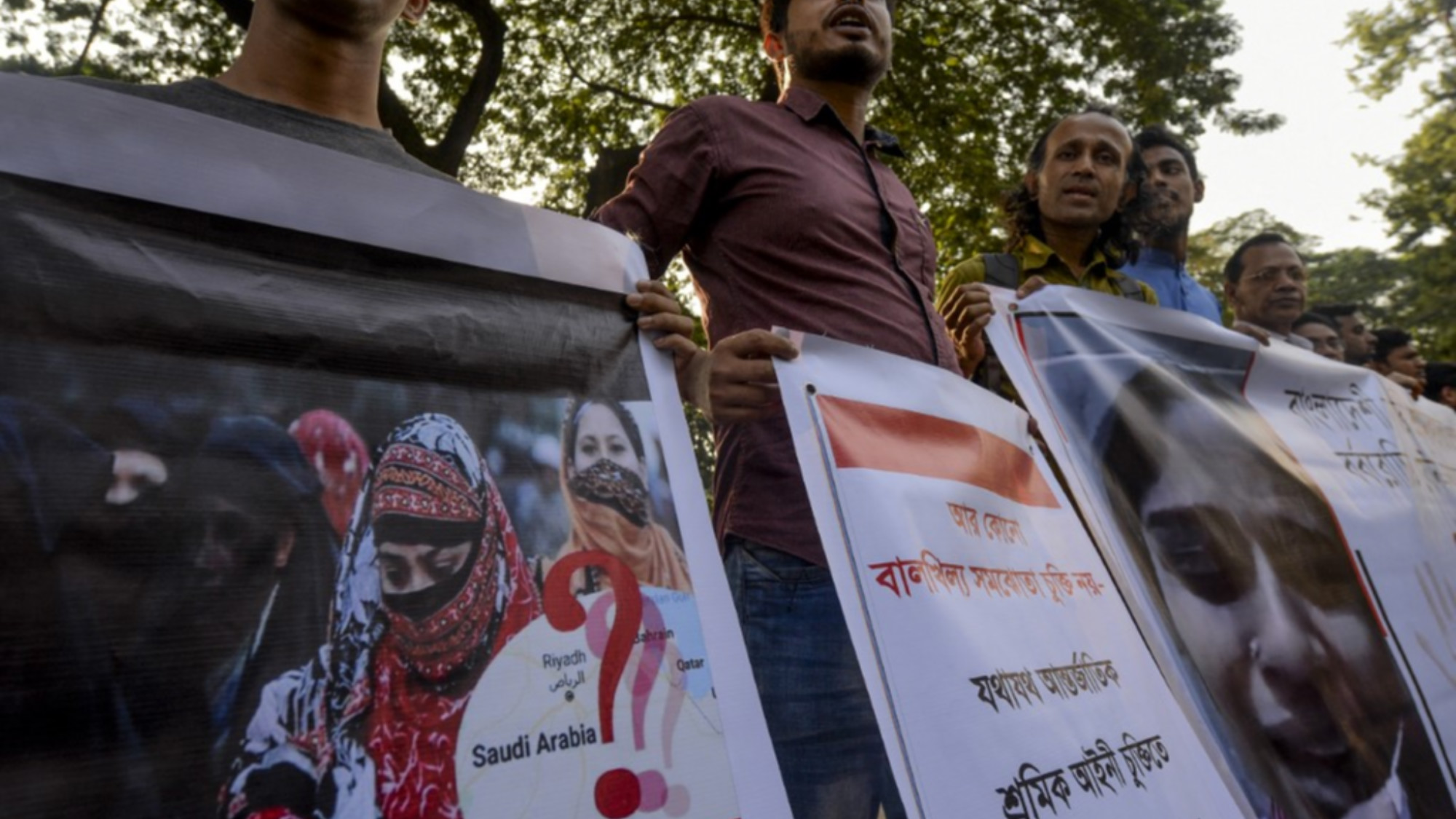Electrocuted decapitated: Migrant worker deaths in Saudi Arabia revealed in HRW report

Scores of migrant workers in Saudi Arabia have died in horrific, avoidable workplace incidents - including falls from buildings, electrocutions and decapitations, Human Rights Watch (HRW) said on Wednesday.
In a new report, the rights group said that Saudi authorities have consistently failed to properly investigate the deaths or compensate families.
Drawing on interviews with families, witnesses, and social workers, HRW’s findings painted a grim picture of labour conditions in one of the world’s richest countries, where construction and infrastructure projects are rapidly accelerating ahead of the 2034 Fifa World Cup and other "giga-projects" under Vision 2030.
Saudi Arabia relies heavily on foreign labour to power its economy. Out of a population of around 34 million, over 13 million are migrants, primarily from South and Southeast Asia, and parts of Africa, according to the United Nations Department of Economic and Social Affairs.
These workers dominate sectors such as construction, domestic work, sanitation and hospitality, often performing some of the most dangerous and low-paid jobs.
New MEE newsletter: Jerusalem Dispatch
Sign up to get the latest insights and analysis on Israel-Palestine, alongside Turkey Unpacked and other MEE newsletters
Despite existing Saudi laws mandating occupational safety measures and employer accountability, the report revealed systemic failures in protecting workers, investigating deaths, and ensuring compensation.
It also documented disturbing patterns of deaths being misclassified as “natural causes,” even in cases where the fatal injuries occurred on worksites.
“The gruesome workplace accidents killing migrant workers in Saudi Arabia should be a huge red flag for businesses, football fans, and sports associations seeking to partner with Fifa,” said Michael Page, deputy Middle East director at HRW.
Without proper safety measures, worker protections or compensation systems, international companies “face a larger responsibility” in preventing further abuses, he added.
Misclassified deaths
HRW interviewed the families of 31 deceased workers, mostly from Bangladesh, India and Nepal, who died in Saudi Arabia between the ages of 23 and 52.
In several cases, families reported being left in the dark about the cause and circumstances of their relatives’ deaths. Often, employers delayed or refused to repatriate remains and personal belongings and, in some cases, pressured families to accept burial in Saudi Arabia in exchange for modest financial incentives.
'The gruesome workplace accidents in Saudi Arabia should be a huge red flag for businesses, football fans, and sports associations seeking to partner with Fifa'
- Michael Page, HRW
In one case, the son of a Bangladeshi man who died of electrocution said the employer made compensation for the family conditional on agreeing to bury the father in Saudi Arabia.
The family refused and had to borrow over $4,000 to repatriate the body, only to receive less compensation than their incurred debt.
Even when deaths were officially documented as workplace-related, compensation was inconsistent or non-existent. One widow said it took 10 years to access the benefits owed after her husband’s death; another family waited nearly 15 years.
Most migrant workers enter Saudi Arabia under the kafala (Arabic for sponsorship) system, which legally binds a worker’s immigration status to their employer.
Despite recent reforms that allowed some workers to change jobs without employer consent, many are still vulnerable to exploitation, forced labour, wage theft, and harsh working conditions.
Gruesome and preventable deaths
The report also detailed accounts of preventable deaths.
One 48-year-old Bangladeshi construction worker fell from a fifth-floor elevator shaft when his safety belt came loose. Another man was crushed by falling concrete blocks.
In another horrific incident, HRW reported that a worker was decapitated by a malfunctioning machine after a colleague accidentally restarted it during maintenance.
Heat-related deaths also remain inadequately addressed. Despite Saudi Arabia listing “diseases caused by exposure to extreme temperatures” in its official occupational hazards list, HRW said enforcement and investigations into heatstroke deaths are sorely lacking.
Workers also reported receiving no bereavement support after witnessing fatal incidents, with some forced to resume work the same day.
On Tuesday, Amnesty International also released a report bringing to light severe abuses faced by over 70 Kenyan women employed as domestic workers in Saudi Arabia.
The report detailed instances of rape, deceptive recruitment practices, denial of rest, non-payment of wages, and inhumane working conditions.
Both Amnesty and HRW's reports come as US President Donald Trump was in Saudi Arabia on a high-stake visit, aiming to strengthen diplomatic and economic ties.
Lack of oversight
HRW criticised Fifa for awarding Saudi Arabia the hosting rights for the 2034 Men’s World Cup without requiring enforceable labour protections, heat mitigation measures, or mandatory life insurance for workers.
Fifa told HRW it would implement a “workers’ welfare system” but failed to provide concrete details on how it would prevent deaths or ensure justice.
The organisation did not respond to specific concerns around compensation, safety enforcement, or retroactive accountability for existing abuses.
During Qatar’s 2022 World Cup preparations, similar worker deaths and labour abuses drew global condemnation. Media investigations and rights groups highlighted thousands of unexplained worker deaths, linked to extreme heat and unsafe conditions.
Unlike previous host nations, Qatar became the focal point of global outrage, with football associations, human rights organisations, and even Fifa sponsors calling for reforms.
Despite sending a formal letter to Saudi authorities on 25 March, HRW said it had received no response to its questions about worker protections and social security.
HRW said the Saudi Ministry of Human Resources and Social Development claimed it conducts routine inspections and enforces labour regulations, but HRW’s findings suggested enforcement is either insufficient or undermined by corruption and misclassification.
middleeasteye.net